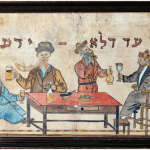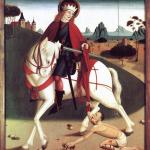It’s not just her writings either. Dorothy Day’s life is a testament to such intractable love, to the possibility of holiness. Writing to a Communist friend, she testifies:
I felt this despair when I lay there in jail for fifteen days, contemplating the fundamental misery of human existence, a misery which would remain even if social justice were achieved and a state of Utopia prevailed. For you cannot pace the floor of a barred cell, or lie on your back on a hard cot watching a gleam of sunlight travel slowly, oh, so slowly, across the room, without coming to the realization that until the heart and soul of man is changed, there is no hope of happiness for him.
On the other hand, you have not felt the ecstasy, the thankfulness, the joy, which caused the Psalmist to cry out, “My heart and my flesh rejoice for the living God.” “My soul longeth and fainteth for the courts of the Lord.” (Psalms 83: 1.) (From Union Square to Rome)
How many times has this despair gripped me? How many times has it taken one Facebook comment, a snide or selfish remark by a friend, even merely my own cowardice, to lead me into the Valley of the Shadow of Death?
Dorothy does not lie. She does not say that this temptation disappears; she simply affirms that there can be more, for one is holy—He who makes us holy.
Yet holiness can seem so distant. St. Lawrence mocked his torturers even as he burned. St. Francis received the Stigmata. St. Teresa was granted burning, pleasurable, horrible, terrifying, awesome union with God. But these people long ago left their bodies. One may read about them, even pray with them. But heroes have always existed in the past. “It always matters what each of us does.” And that means finding heroes today, heroes to motivate us to be God’s hands now. Dorothy may inspire us to see that there is Godly work being done in our lifetimes, or just before them. She may lead us to see that, however hellish the world is, we have an Incarnate God around whom to build our hope.
This is, of course, nothing new. In Red Beard, Akira Kurosawa depicts how the humble life of a simple man can change lives. Many works of art try to stir in us such hope. They help. But Dorothy, her beautiful, Godly, existence, lived within the last century—a life of peace, humility, and self-abnegation—such brings if not assurance, at least the belief in the possibility of going on. As she put it:
When the world is too much with us, how wonderful to think on these things, to let the mind rest on these things, to rejoice in these words: God is Light, Infinite Beauty, Goodness, “for there is no good save only God.” (On Pilgrimage)
Ora pro nobis.













